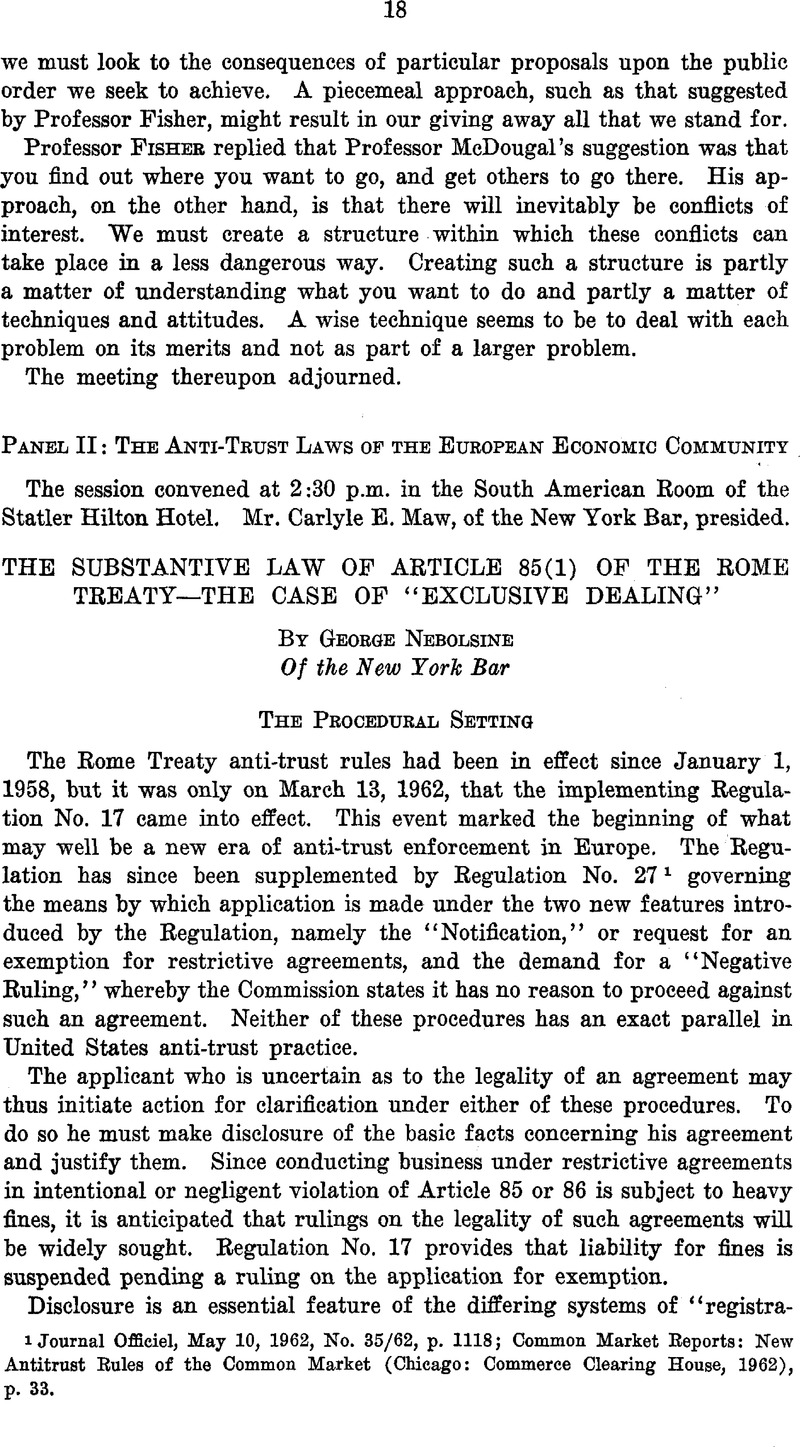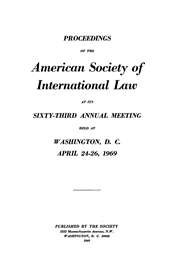No CrossRef data available.
Article contents
The Substantive Law of Article 85(1) of The Rome Treaty—The Case of “Exclusive Dealing”
Published online by Cambridge University Press: 27 February 2017
Abstract

- Type
- First Session
- Information
- Copyright
- Copyright © American Society of International Law 1962
References
1 Journal Officiel, May 10, 1962, No. 35/62, p. 1118; Common Market Reports: New Antitrust Rules of the Common Market (Chicago: Commerce Clearing House, 1962),p. 33.
2 Form A. IV and Form B. V. Eegulation No. 27.
3 Verloren van Themaat, Competition and Eestrictive Business Practices in the EEC. 1960 Institute on Legal Aspects of the EEC 114.
4 DeGeus c. Van Eijn and Robert Bosch G.m.b.H., Court of Justice Case No. 13/61, April 6, 1962 (manuscript).
5 Third Annual Report of the EEC Commission (1960), par. 140.
6 Geitling Case, Case No. 2-56, I I I Eeeueil (1957) 9, 41. This case is in sharp contrast to the Bosch case cited above. The semi-official commentary on the EEC Treaty, the OEEC Guide, EEC 2, 2 states: “The object or effect of an agreement … must be to hamper, restrain or distort competition. The object or effect of the agreement must be assessed in the light of existing circumstances at the time when the assessment is made and of foreseeable future circumstances.” (Italics added.) This certainly refers to the second condition.
7 EEC Commentary, European Parliamentary Assembly Doc. No. 57, 1961-1962, p. 54.
8 The text in German uses the word “geeignet,” which means “likely to” or “apt to“; the French term used is “susceptible d'affecter,”which is closer in meaning to “may” or “capable of“; the Italian is “possano,” meaning “capable of” and the Dutch is also neutral, being “kunnen.” Thus the equally valid texts range from the narrow term “likely to” to the sweeping “capable of.” Commentators have argued that the Treaty cannot be given a broader application than is permitted by the most restrictive form of words used. This appears in the German text meaning “likely to.“
9 Third General Report, EEC Commission (1960), par. 140.
10 OEEC Guide, EEC 2.2.
11 The Frankfurter Kommentar of Kaufmann, Rautmann, Striekrodt, v. Hahn, Hoffmann, Kreifels, Vorbemerkungen zu den Art. 85 ff. des Vertrages über die Europäische Wirtschaftsgemeinschaft 8 (1959), views the word “harmful” as not being satisfied by a mere influence on trade between Member States. On the other hand, the commentary of Wohlfarth-Everling-Glaesner-Sprung, Die Europaische Wirtschaftsgemeinschaft 243 (1960), takes the position that all that is needed to satisfy the criterion is some influence on trade between Member States. Professor Steindorff, The Provisions Against Restraints of Competition in the European Community Treaties and the National Law 196, 197 (Frankfurt Institute, 1961), is of the same opinion.
12 The case had been decided by the German Federal Ministry of Economy (opinion of Feb. 17, 1959, 9 WuW 5, 385-386) and had been submitted to the EEC Commission for an opinion.
13 Opinion of the EEC Commission. European Parliament, Report. Doc. No. 51, 1959, p. 19.
14 Verloren van Themaat, Some Problems of Competition in the Common Market, Britain in Europe (1959).
15 See note 12.
16 See note 13.
17 Verloren van Themaat, op. cit. note 14 above.
18 EEC Commentary, op. cit. note 7 above, p. 54.
19 The problem of the applicability of Art. 83(1) to vertical restraints deserves a broad and extended discussion, which is impossible in the limits of this paper.
20 European Parliamentary Assembly Doc. 57, 1961-1962, pp. 41-42.
21 EEC Commentary, cited note 7, p. 54.
22 Journeés d'etudes de Caen, 1959. Les exclusivités de vente, p. 38.
23 Nicolas et la Société Brandt c. la Société Photo-Badio-Club, Cour de Cassation, Chambre Criminelle, 11 juillet 1962.




